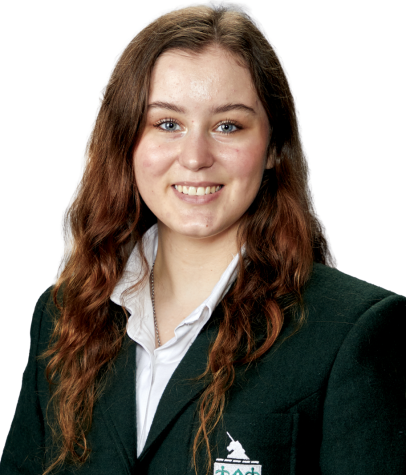Living in a pandemic
The COVID-19 pandemic transformed economic, social and political systems around the globe, bit its impact also was deeply personal. Hear from students how the pandemic changed their daily lives and influenced their goals, passions and values.
January 29, 2023
When the COVID pandemic first came crashing down on our world in 2020, I never thought that my life would change as much as it did.
Unlike most of my peers from my small middle school, I stayed inside from the minute the lockdown was announced until the beginning of my freshman year. My grandma, who had lived with my mom and I since I was born, was still fighting off effects from chemotherapy and radiation, so I never took any chances when it came to going out. Because of this, my introduction to Hockaday was rather peculiar.
The only communication I had with other freshmen was social media. I met up with one or two people over the summer, but only after my mom basically forced me to. When the school year started and we were all on Zoom, I realized just how difficult it would be to put myself out there if I couldn’t go out there. Nothing was more awkward than privately messaging people in my classes to ask for their Snapchat or Instagram, but it was well worth it because I got to engage with my classmates and finally make new friends. In some ways it was easier, seeing as I could take my time responding to people and talking to them over a phone was much easier.

Moving past that awkward stage of freshman year, I quickly got acclimated to Hockaday and loved it here instantly. Unfortunately, my grandma passed away in November of 2020 and it hit my mom and I pretty hard. I had never known a life without my Oma, which made it increasingly difficult to get through my classes. Her death made my mom and me even closer than ever, which I didn’t think was possible at the time.
When I think of how COVID changed my everyday life, I immediately think of my physical health. I had a mild case of COVID in December of 2021 and slept most of my Christmas break, but after feeling so worn down I really wanted to build my body back up. I started going to the gym every night, making time even on school nights to go, so I could be strong and healthy. The pandemic made me realize how much I took my health for granted; some of my family still suffers from the lasting effects, like shortness of breath and a weak immune system. I’m increasingly grateful for my health.
As I look back on it, I’m slightly thankful that COVID happened. I spent almost every second of every day with my grandma, seconds I would have lost if I had had a normal summer in 2020. I appreciated all the extra time I was granted with her, through both the good and bad stages of it. I appreciate my health, my mom, my new friends and remaining family more than ever. I feel immeasurably blessed and lucky to live the life I have right now, even during the more difficult times.
For me, the year 2020 marked a period of abrupt societal change: stores closed down as lockdown began, students attended school through a computer screen, and people stopped greeting passerby on walks. Isolation wasn’t just a product of the pandemic – it was the new normal. With isolation came loneliness, but it also provided an opportunity for reflection.
What happens when you suddenly have extra hours in your day to fill? What happens when you’re alone with your thoughts and ideas? And what happens when no one is there to encourage or discourage whatever path you take?
For me, this path was delving deeper into one of my hobbies, music. As a classically trained musician, I had mostly played pieces written by other composers. While learning a new piece challenged me musically, it didn’t fulfill me creatively. I wanted to be the one behind the music, the one who decided when and how each note was played, but more importantly, why. It fascinated me how composers meticulously crafted each and every note, and each note had its own place in the piece. I spent hours studying different pieces of music, both classical and contemporary, trying to understand the intention behind each work of creative genius.
On morning runs, I listened to my favorite songs and analyzed the lyrics. Eventually, I moved into more unfamiliar territory: figuring out how a bassline contributed to the build-up of a prechorus, how the reverb of a snare drum captured the emotion of a song, how the melody of a topline complimented the lyrics, and how the frequencies of a synth enhanced the vocals. It was through these “study” sessions that I learned how to write and produce my own songs.
While at first the quality of my songs were far below those of my favorite artists, I slowly started to improve. The added free time of lockdown coupled with the slightly-reduced workload of sophomore year allowed me to practice writing songs every day. Even if I didn’t write a complete song, I still tried to write at least a verse every day. I figured that as long as I had the time and energy to pracetice – which I did – there was no reason not to. Plus, songwriting gave me a much needed break from staring at a screen.

Through songwriting, I was able to process the ever-changing world around me. One of my songs, called “The Epilogue,” imagined a utopian world free from society’s current issues, such as the anxiety of the pandemic and perils of social media. It compared the idealistic nature of this made up world to the qualities of an epilogue, in which the story’s loose ends are tied up but often a new problem emerges. From writing this song, I realized that we can never truly solve every problem in the world; instead, all we can do is be kind to others and keep working to better society.
Most of all, creating music helped me improve my relationship with myself. With no one physically there to judge my music or influence my composition process, I developed my own system of critiquing my work. I learned that I can have high standards while simultaneously acknowledging and appreciating the effort I put into each song. Even if a song isn’t my best work, the vulnerability I expressed while making it is still worth something. Moreover, while opinions from others are certainly valuable, my own opinion of my work always will and should outweigh them – if I don’t love what I create, how can I expect someone else to love it? How can I maintain my artistic identity in the face of inevitable criticism? I came up with a new rule: everything I release has to be something I’m proud of regardless of what other people think.
This new philosophy of appreciating effort over results carried into my academic life. Gradually, I began to notice the moments when I became more confident in solving logarithmic equations, when I was able to speak in Spanish without having to mentally translate the words from English first. Although the isolation of lockdown led to widespread mental health challenges, embracing solitude revolutionized the way I view myself and society for the better.




